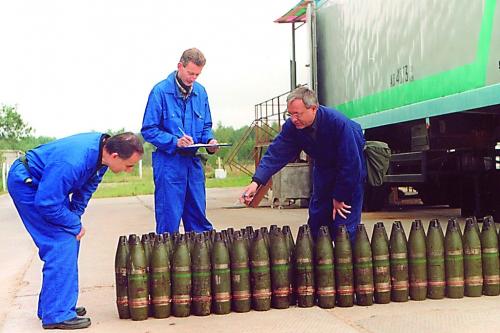Senior UN official urges confidence-building measures to counter global insecurity
The United Nations disarmament chief today urged Member States to build confidence and trust with each other by establishing and strengthening global norms on disarmament issues related to nuclear weapons and conventional arms, including by continuing negotiations on a global arms trade treaty.

Inspectors from the Organisation for the Prohibition of Chemical Weapons (OPCW) inventory a stockpile of 22mm chemical artillery projectiles.
“Throughout the history of UN efforts in disarmament, efforts to eliminate weapons of mass destruction have been pursued in parallel with efforts to regulate and reduce conventional arms. This is because they are mutually reinforcing goals,” High Representative for Disarmament Affairs Angela Kane told the opening of the annual three-week session of the UN Disarmament Commission (UNDC) in New York.
The Commission, whose membership is universal, is a deliberative body mandated to make recommendations in the field of disarmament and to follow up the decisions and recommendations of the General Assembly’s first special session devoted to disarmament, in 1978.
The Commission itself was created through Resolution 502 in 1952 due to the General Assembly’s “anxiety as the general lack of confidence plaguing the world and leading to the burden on increasing armaments and the fear of war,” Ms. Kane read.
She said the world continues to face a “lack of confidence” today, which feeds instability in the Middle East, South Asia and North-east Asia, while underlying expansion of military budgets and accounting for deeply divided votes in the General Assembly on issues related to disarmament, among others.
The first item on the Commission’s agenda concerns non-proliferation of nuclear weapons. In her speech, Ms. Kane said an agreement during this session would help establish a new consensus on nuclear disarmament when the Commission concludes its three-year cycle in 2014.
She added that such an outcome would be a “tremendous achievement” given the timing of the 2015 Review Conference of the Parties to the Treaty on the Non-Proliferation of Nuclear Weapons (NPT), and the stalemate in recent years within the UN Conference on Disarmament, the world’s sole multilateral disarmament negotiating forum.
The Commission is also due to discuss confidence-building measures in the field of conventional weapons. Ms. Kane told participants that they have an opportunity “to build on the recent progress made last month in negotiating the Arms Trade Treaty.”
Member States failed to adopt the treaty last week after two-weeks of negotiations in New York. Secretary-General Ban Ki-moon said he was deeply disappointed but remained optimistic that Member States will continue exploring ways to bring the treaty into being.
Among confidence-building measures related to transparency, Ms. Kane noted that the UN Office for Disarmament Affairs maintains the UN Report on Military Expenditures, along with an electronic database of information known as the UN Register of Conventional Arms.
Ms. Kane encouraged Member States to use these tools “precisely because of their value in building the indispensable confidence needed to strengthen international peace and security.”
Between 1979 and 1999, the Commission was able to reach consensus at least 16 times to adopt guidelines or recommendations on disarmament subjects. It has not adopted any new guidelines since 1999. Ms. Kane noted that history will judge the Commission not by the quantity of its work but the quality of its outcomes.
She also urged Member States to revive the productivity of the Commission as an international resource for cultivating “seeds of future global disarmament norms – guidelines, standards, and recommendations that someday have the potential to flourish into customary practices.”
Source: UN News
- 382 reads





